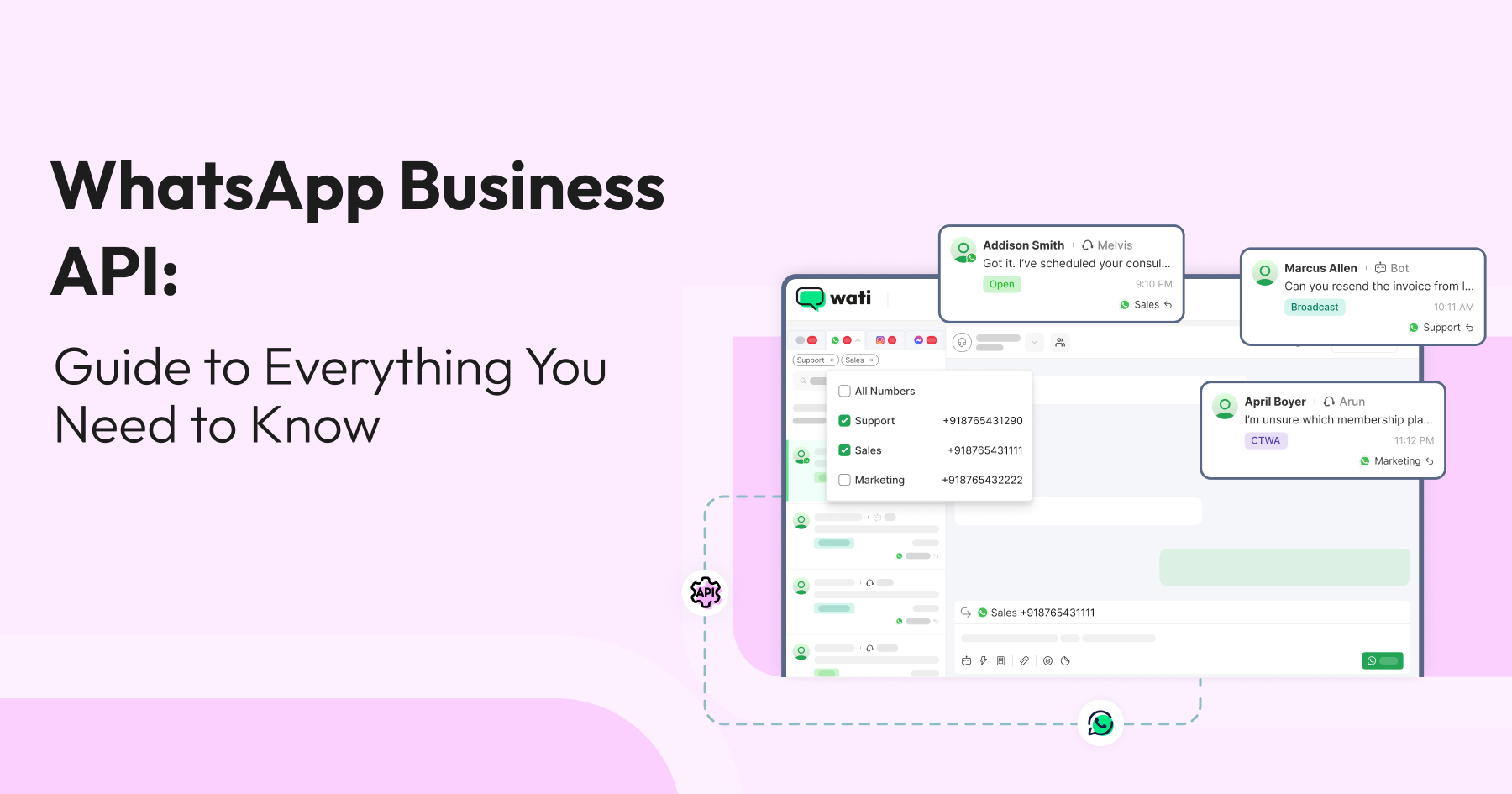
WhatsApp Business API in 2026: The Complete Guide
Written by:
 Shreya
|
on:
March 25, 2024
|
Last updated on:
November 28, 2025
|
Fact Checked by :
Shreya
|
on:
March 25, 2024
|
Last updated on:
November 28, 2025
|
Fact Checked by :
 Namitha
|
According to: Editorial Policies
Namitha
|
According to: Editorial Policies
Too Long? Read This First
- Discover WhatsApp Business API as a powerful tool built for medium to large businesses to scale customer communication with automation, chatbots, and bulk messaging.
- Unlike the free WhatsApp Business App, the API offers advanced features like CRM integration, message templates, and interactive media support.
- Businesses benefit from improved efficiency through automated messages, personalized flows, and integration with e-commerce and support tools.
- WhatsApp Business API helps with compliance, high-volume communication, and system-wide messaging that's ideal for regulated industries and growing teams.
- A complete WhatsApp Business API Account includes a branded profile, messaging tools, analytics, and integration options to build better customer relationships.
Even today, best-in-class sales teams lose focus while dealing with bulk messaging.
It’s not their efforts, but the system that’s siloed, and leads that consistently grow in volume.
Yes, WhatsApp is your popular messaging app, but if you are still struggling with the normal WhatsApp account, you are lagging behind, and it’s time to move to WhatsApp API.
Most brands adopt WhatsApp Business for customer communication. What falters is that WhatsApp Business doesn’t provide advanced features that’ll help brands convert.
And here is where WhatsApp Business API solutions come in. It’s your go-to WhatsApp business platform for AI-powered chatbots, bulk notifications, support tools, and bulk marketing messages.
Switching to a WhatsApp Business API tool like Wati provides advanced features to automate sales conversations, save time, and increase productivity to scale revenue.
In this guide, we’ll break down the ins and outs of WhatsApp Business API, how to use it, and how to integrate it with your existing CRM or ERP to strategize customer communication in a better way.
What is WhatsApp Business API?
WhatsApp Business API is an advanced version of WhatsApp Business App that manages broadcast, automates repetitive tasks, and tracks sales performance.
WhatsApp Business API can be integrated with CRMs, helpdesks, or custom dashboard software to retrieve contact details, assist consumers faster, and improve team productivity.
With a WhatsApp Business API account, you can
- Schedule WhatsApp messages.
- Organize incoming messages.
- Access a shared team inbox.
- Manage delivery status and read receipts.
- Engage with customers using suitable Meta-approved templates.
- Enhance visibility of team progress.
- Analyze ROI from WhatsApp campaign results.
- Build engaging WhatsApp campaigns smoothly.
- Attract new audiences and retain existing loyal customers.
WhatsApp Business API Account vs. WhatsApp Business: What Sets Them Apart?
While both tools are designed for business communication, WhatsApp Business API provides more advanced features and integration options.
Mostly, the reason why businesses are switching to WhatsApp Business API is because of advanced features like inbound intelligence, bulk messages, shared team access, rich media, automated responses, improved message delivery, AI marketing and promotions, and advanced analytics.
WhatsApp API features allow different teams to get important updates and notifications in a consolidated dashboard. It’s a powerful tool for small businesses to boost customer trust, meet business needs
As you know, the WhatsApp Business App comes with a ready-to-use mobile and web interface, perfect for small businesses to start instantly, whereas the WhatsApp Business API requires a BSP provider like Wati to set up and manage, offering advanced automation and scalability for larger teams.
Below are the differences between WhatsApp Business API and WhatsApp Business App to consider:
| Feature | WhatsApp Business | WhatsApp Business API |
| Hosting and setup | Runs on a single smartphone (and up to 10 linked devices) | Hosted on a server or cloud infrastructure, managed by a BSP. |
| User Access | 1 phone + 10 linked devices. All agents share one identity. | Unlimited agents, bots, and users through a shared team inbox. |
| Automation | Basic: Quick replies and simple away/greeting messages. | Full integration with AI-powered chatbots, message templates and more. |
| Integration | None. It is a standalone application. | Natively integrates with CRMs and ERPs |
| Verification | Standard business profile | Requires Meta Business Manager verification to get started. |
| Messaging Rules | Can message anyone at any time. | A 24-hour customer service window is initiated by a user message. |
| Core Functionality | Supports voice and video calls. Can participate in groups. | Does not support voice/video; all communication happens through automated or agent-assisted text messages. |
WhatsApp Business API, is different from other versions of WhatsApp, as it provides CRM integration to store, retrieve and deploy contact data into direct WhatsApp conversations.
Also Read: Difference between WhatsApp Messenger, Business App and Business API
5 Key Components of WhatsApp Business API
WhatsApp API consists of several components that work together to help businesses communicate with customers. Here are the main components of WhatsApp Business API:
Meta Business Manager (MBM)
The Meta Business Manager (formerly Facebook Business Manager) is where you manage all your business assets, including your ad accounts, pages, and, most importantly, your WhatsApp Business Account.
You can implement an API without MBM, but you won’t be able to send messages or communicate with customers. WhatsApp Meta verification proves that you are a legitimate business, which is the first and most critical step to unlocking API’s features.

The WhatsApp Business Account (WABA)
The WABA is the “container” that lives inside your Meta Business Manager. It doesn’t have an interface itself. Your WhatsApp Business account is used to connect your phone numbers to the API. You can manage multiple phone numbers for different departments or countries, all under a single WABA.
The official WhatsApp Business Account represents your brand identity and enhances your credibility among customers, allowing them to contact you directly.
Dedicated Phone Number
This is the number your customers will see and message. It can be a new number or an existing one (mobile, landline, or 1-800), but it must not be tied to an active, regular WhatsApp or WhatsApp Business account. You will have to delete the existing account on that number before migrating it to the API.
This number becomes your permanent, scalable gateway for all customer conversations, managed by your entire team and bots, not just one phone.
Also read: How to set up a virtual phone number for your WhatsApp business to maintain professionalism, enhance business reputation, and reduce the risk of spam listings.
A Business Solution Provider
Since WhatsApp Business API has no front-end, you need a BSP like Wati to provide the software, hosting, and interface. Your BSP gives you the dashboard to manage contacts, a shared team inbox, chatbot builders, and pre-built integrations.
Wati, as a WhatsApp API provider (BSP) also provides you with a complete infrastructure to manage WhatsApp communications. You can just integrate the API with your sales CRM, and you’re ready to use all the features of the API directly via Wati.
Also Read: Looking to streamline WhatsApp messaging via CRM? Learn how Wati’s WhatsApp HubSpot integration provides contact history and improves sales efficiency.
Message Templates
For WhatsApp Business API, Meta strictly controls the structure of customer messages to prevent spam. Any message you send to a customer outside of the 24-hour customer service window must be a pre-approved message template. These templates can be transactional (order confirmations) or promotional (new offers).
This is the primary tool for your outbound sales and marketing. Mastering templates is key to re-engaging leads and automating outreach at scale.
How to Set Up WhatsApp Business API Account?
To initiate WhatsApp Business API, businesses must link their account to a server or cloud hosting, a step that demands technical know-how.
Once connected, they need to create a Business Profile, displaying crucial details like address, website, and operating hours.
Here is a step-by-step process to access WhatsApp Business API:
Step 1: Choose Your API Solution Provider
BSPs offer WhatsApp APIs for businesses to build their solution on top of WhatsApp APIs. These BSPs can help you communicate with your customers using WhatsApp APIs for approved use cases, including customer support and time-sensitive, personalized notifications.
With Wati, you will get a complete WhatsApp CRM with a dedicated WhatsApp Team Inbox to manage communications.
You can just integrate it with your WhatsApp Business API number and you’re ready to use all the features of the API directly via Wati.
Get Your Meta Business Manager Verified
This step proves to Meta that your business is legitimate.
You’ll need to submit an official document, such as a business license or like a business license or a utility bill, to your Meta Business Manager account. Once approved, you’ll be an official Meta-verified business.
Get A Dedicated Phone Number
You’ll need a phone number that will be used only for WhatsApp Business API. It helps keep professional and personal messages separate, exhibiting more brand authenticity.
Sign Up and Go Live
This is the final step where you connect everything. Once your Meta account is verified and you have your number, you’ll sign up on chosen platforms (like Wati).
It will guide you through connecting your new “Meta Business Manager Account” and registering a “new, dedicated phone number” to the API.
Complete Business Profile
This will be a digital storefront on WhatsApp. Make your profile look professional by adding a brand name, logo, website, address, business hours, and even product catalogs.
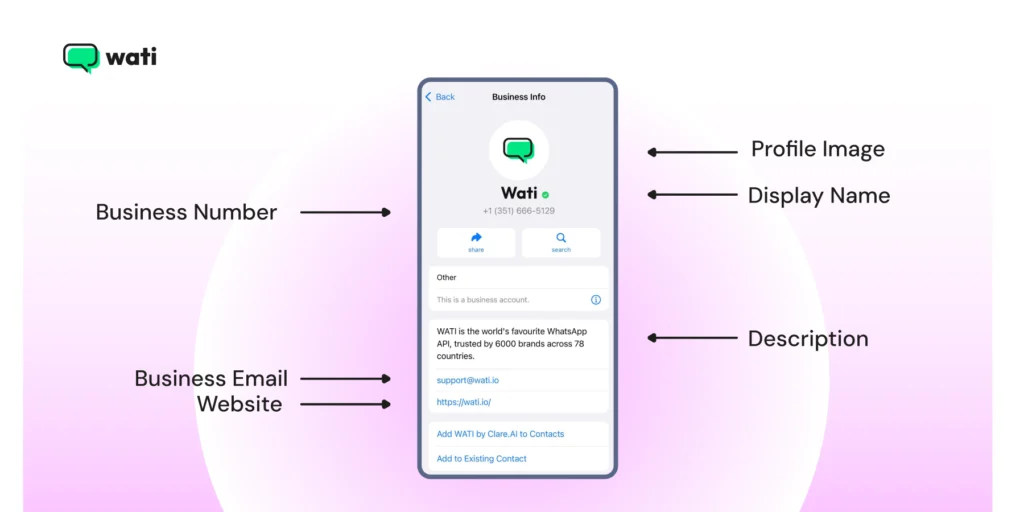
Once these steps are complete, you can start building your chatbots, creating message templates, and connecting your sales team to the shared inbox.
Also read: How to write the best WhatsApp Business Description in 2025.
8 Key Features of WhatsApp Business API
While WhatsApp Business is an effective way of customer communication, WhatsApp Business API provides the infrastructure to handle multiple conversations at scale.
Whether you are a medium-sized business looking to streamline your communication process or a large enterprise seeking advanced features and integrations, WhatsApp Business API helps improve sales efficiency.
Below are some of the top features of WhatsApp Business API, like Wati
Automated Messaging
Businesses can send automated messages to customers, such as order confirmations, appointment reminders, and shipping notifications.
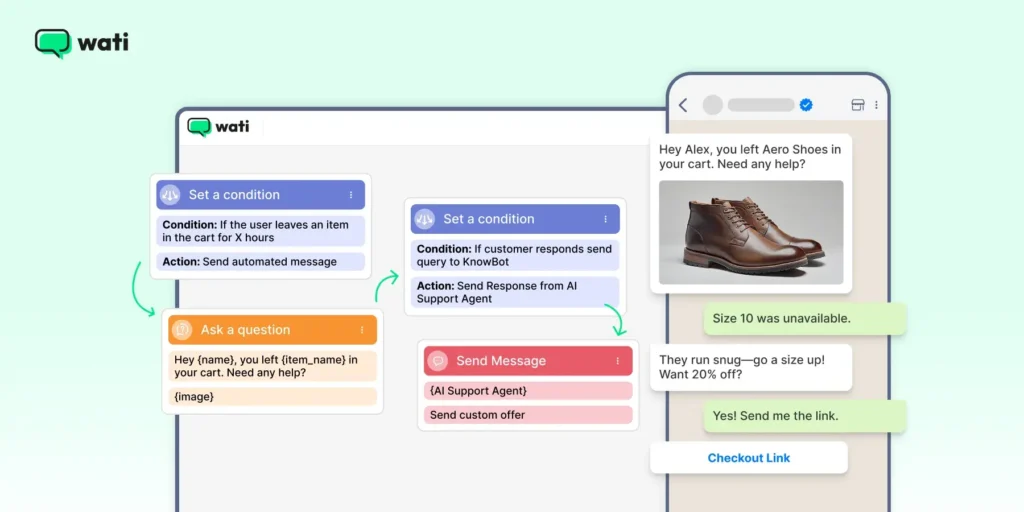
No Code Chatbot Builder
Businesses can quickly create and deploy no-code chatbot builders to handle bulk customer queries and assist with support issues, and free up sales bandwidth.
Message Templates
Offers pre-defined messaging templates that businesses can use to make their outreach easier. With a set of attractive templates, you can polish your campaigns and make your promotional offers more exciting for customers.
Media Sharing
Businesses can share a wide range of media types with customers, including images, videos, and documents. Businesses can design interactive product catalogues and link it to automated offers or discounts to add value for customers.
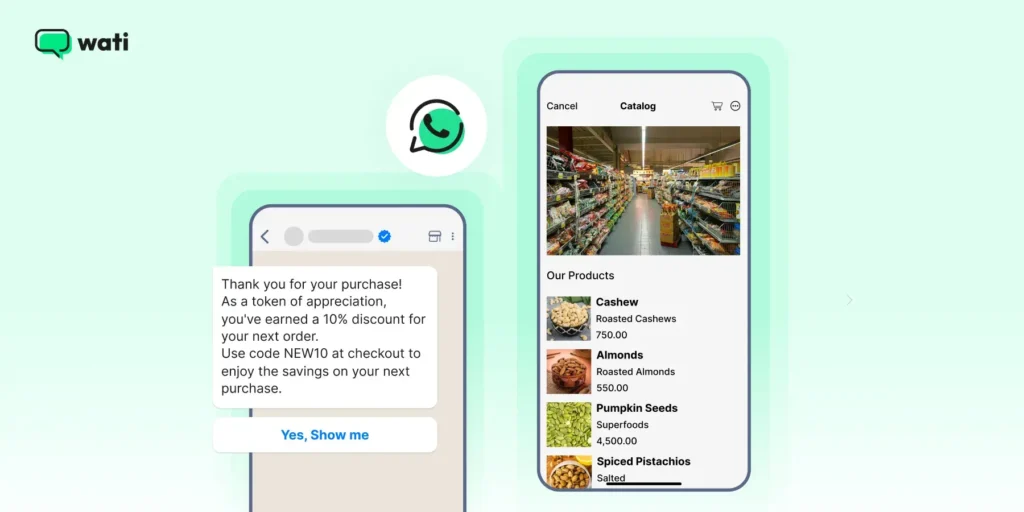
This can help to provide customers with more detailed information about products and services.
Shared Team Inbox
Sales agents can view ongoing WhatsApp conversations with customers across departments to improve productivity, reduce response time, and push the envelope on conversion.
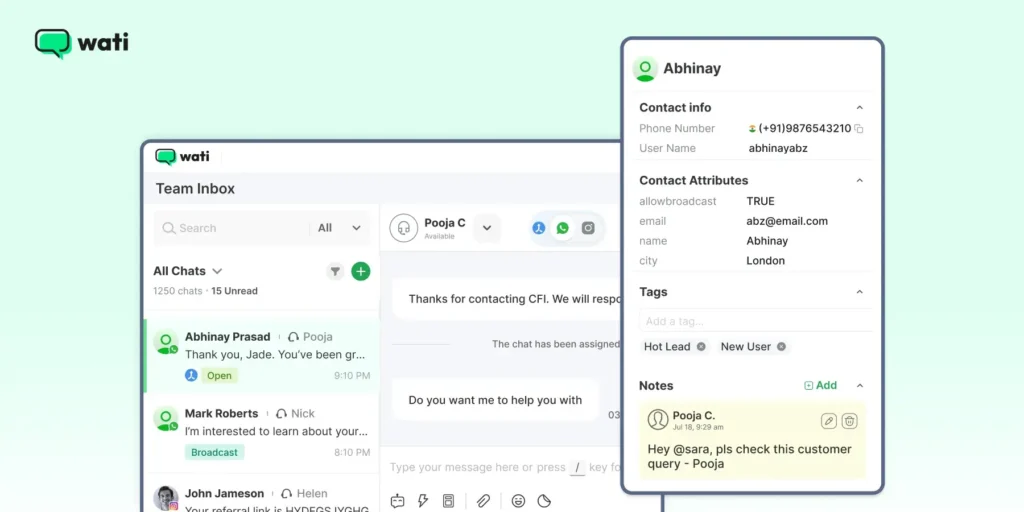
With shared team inbox, agents can get visibility into lead progress, view older conversations and predict the success possibility of conversion. Managers also can have real-time insights to monitor performance and productivity.
Advanced Analytics
With pre-built audience segmentation and reporting features, users can segment audiences, feed them to campaign lists, and add those filters to extract exact numbers and prove WhatsApp marketing ROI.
SMS Fallback
WhatsApp Business API, like Wati, also offers an SMS marketing feature in case you fail to deliver a WhatsApp broadcast message to users.
This improves the delivery rate, expands geographic reach, and enhances delivery rate, expands geo reach, and improves the scope of conversions.
CRM or ERP Integration
WhatsApp Business API can be integrated with a range of other tools, like HubSpot CRM, Salesforce CRM, to retrieve contact profiles and build informative customer outreach messages and business communication.
Also read: How to connect HubSpot to WhatsApp to remove data redundancy and accelerate revenue growth in 2025.
Do You Need WhatsApp Business API?
If you are an enterprise and are still banking on email marketing platforms, that is a massive hit on sales.
For a customer base between 100-500, linking WhatsApp Business API to enterprise CRM helps manage sales on a macro scale and supports impact.
But, what makes WhatsApp Business API from a customer point of view? Let’s check how customers use WhatsApp at large and how it impacts marketing ROI.
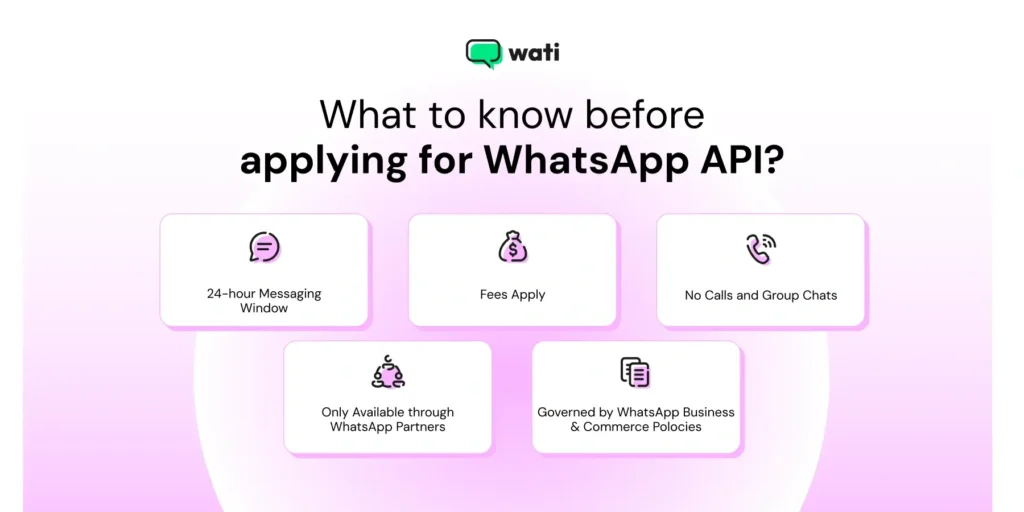
Are You Small, Mid-Size or Enterprise Business?
WhatsApp API for sending messages is designed for medium to large businesses that need to communicate with a large number of customers. With more than 3 billion WhatsApp users and 45-60% open rate, WhatsApp beats email by a huge margin of 114% as a customer acqusition channel.
If you are a SMB or early adopter, working with WhatsApp Business Account without an API might be the right call for customer acquisition.
What Is the Capacity of Your Customer Pipeline?
If you need to communicate with customers frequently or in large volumes, WhatsApp Business API may be a good choice. Having a large sales pipeline is the ideal situation that calls for a WhatsApp Business API integration. With email open rates shifting between 20-25%, WhatsApp yields significantly higher returns in customer engagement and marketing campaign management.
Its ability to broadcast messages in bulk and use chatbots for automated conversations can help businesses manage customer communication more efficiently.
Do You Use Third Party API Integrations?
If you use other business tools such as CRM systems or e-commerce platforms, WhatsApp Business API’s ability to integrate with these systems may be a major advantage.
With WhatsApp Business API, you can integrate CRM seamlessly, without falling into the rat trap of technical complexity of webhooks or other dynamic APIs.
Also read: Learn how Wati’s WhatsApp Business API integrations make your everyday sales workflows easier and accelerate team collaboration.
Are You Compliant and Data Security Focused?
If your business operates in an industry with strict regulatory requirements, such as healthcare or finance, WhatsApp Business API’s ability to offer pre-approved message templates and comply with WhatsApp policies may be important.
If you value consumer’s security but still want to target huge broadcasts, WhatsApp API gives you the best of both worlds. While you launch broadcast campaigns on huge batches, the security still doesn’t get compromised.
WhatsApp Business API Pricing for 2026
The primary question from medium to large businesses that may be looking for a WhatsApp API account is related to its pricing.
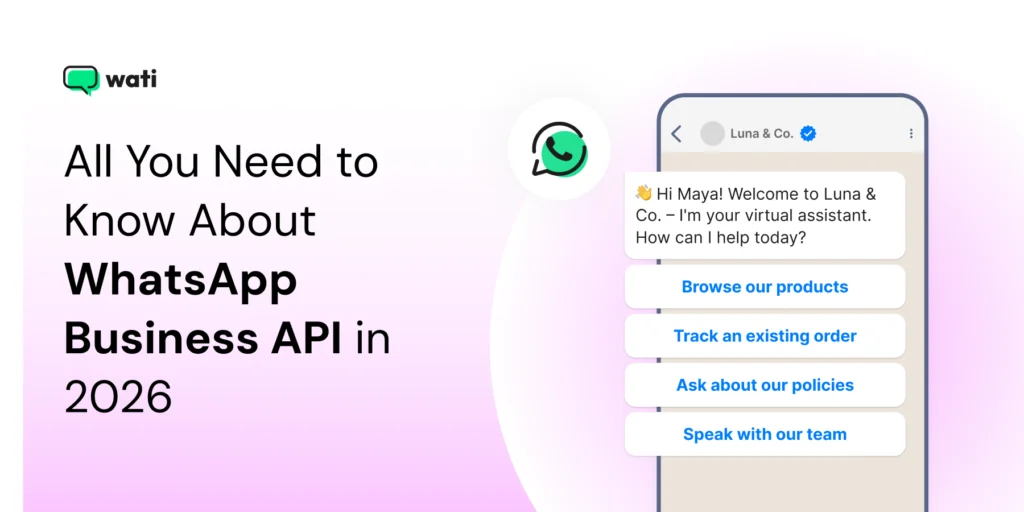
If you plan to integrate a WhatsApp Business API, such as Wati, it would be wise to check which plan best suits your business needs. We primarily offer 3 types of subscription plans listed as under:
- Growth Plan: With the growth plan, you can send WhatsApp messages to thousands of users in one click to improve reach. It includes 3 user seats, additional charges for WhatsApp messages and no additional users.
- Pro: With the Pro plan, you can set automations, integrations and get powerful analytics to boost integrations. It includes 5 user seats, and additional users can be added with an extra monthly charge.
- Business: With the Business plan, you can unlock the full potential of WhatsApp with advanced workflows and expert support. It includes 5 user seats and allows for additional users at a monthly charge.
Learn more about Wati’s pricing to make a decision on what plan suits your business the best and can help your sales teams.
How Does Wati’s WhatsApp Business API Scale Customer Interactions?
If you’re ready to storm your customer communication, Wati is the perfect tool for you. Wati enables businesses to communicate with customers at scale, while providing a range of powerful features and WhatsApp API integration options, as mentioned before.
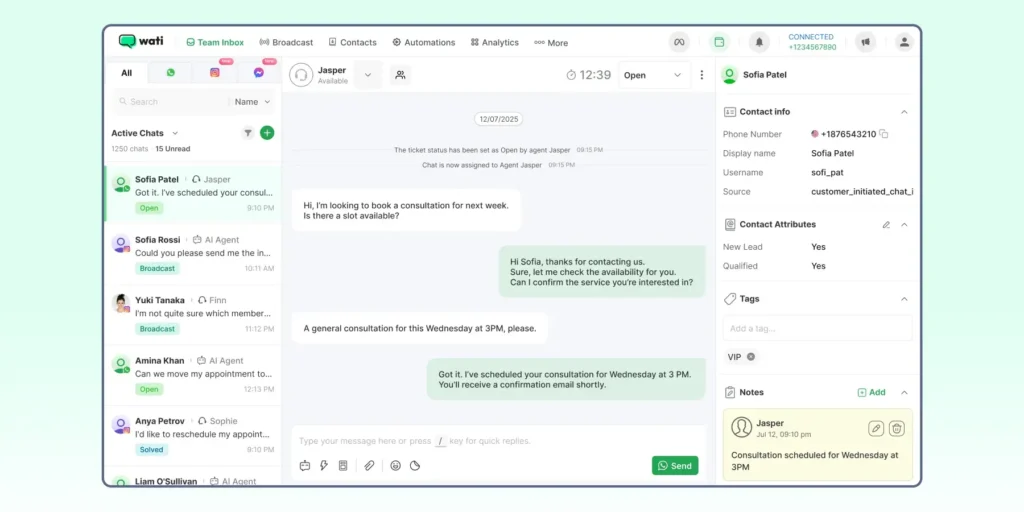
Creating an account on Wati’s website and connecting it to your WhatsApp API account is a straightforward process. You can link API account to existing tech stack, to automate your e-commerce cycle.
Below are the key applications of Wati that take your sales strategy to next level and shoot your conversions:
- Shared Team Inbox: With shared inbox, you can dynamically track conversation progress, enable shared access, and accelerate your sales pipeline. Unified inbox also allows managers to track sales agent performance, track funnel progress in real time and optimise ROI opportunity.
- No Code/Low Code Builder: Wati’s chatbot automation helps you generate quick replies for seamless and scaled consumer interaction. By integrating a custom chatbot, it becomes easy to strategically tackle new inquiries and never lose touch with the customer. This frees up sales bandwidth for more crucial tasks and optimises your sales conversations.
- SMS Fallback: With Wati, you can trigger SMS marketing feature to eliminate meta restrictions in specific demographics. With SMS marketing, you can improve your message delivery rates and reduce the chance of spam listing.
- Prebuilt audience segmentation: Wati allows teams to categorise new sales qualified leads (SQLs) into specific buckets like winback, highly engaged. at risk, and valid to simplify the work of a sales representative. With segmentation, you can intelligently engage with your inbound and outbound prospects.
- Advanced analytics and Reporting: Wati’s comprehensive analytics dashboard provides a one-click performance overview to quantify marketing ROI and get a clear picture of accurate conversion numbers. Having access to success metrics helps you learn what’s working and what’s not.
- Partner Integrations: With WhatsApp Business API, you can link your WhatsApp account back to CRM or other third party automation tools like Zapier, Razorpay, Shopify, HubSpot and so on without getting into the fuss of dynamic API coding.
- Pre-approved templates: Wati also offers a repository of pre-defined meta templates to fuel better conversations. For example, if a lead unsubscribe, the system will arrange it in a seperate automation and trigger “automated template” to re-engage the lead.
- AI support agents: With Wati, you can dynamically re-route queries to AI agents to tackle basic as well as complex queries. These agents provide instant, accurate answers to your prospects based on your company’s knowledge base.

Related Read: How to Reduce & Recover Your Shopify Abandoned Carts in 2025 [A Complete Guide]
Automate WhatsApp Message at Scale With WhatsApp Business API
As we wrap this up, for a business like yours, understanding your current customer and revenue scale is crucial.
If you are looking to scale your sales potential or aiming for strategic automation, WhatsApp Business API is the ideal choice. With this tool, you can automate repetitive tasks, track efficiency, and personalize consumer engagement all within one platform.
Figuring out what works for you in the long run and capitalizing on WhatsApp marketing via WhatsApp Business API tools, such as Wati, can give you that market mover advantage and help scale your ROI.
Get access to WhatsApp Business API Today. Book a demo to see WhatsApp API in action with Wati.
Frequently Answers and Questions about WhatsApp Business API
Look beyond basic API access. The best BSPs, like Wati, provide a robust platform with a shared team inbox, a no-code chatbot builder, and pre-built CRM integrations (like HubSpot or Salesforce) to ensure you can actually scale your sales and support teams.
Yes, but you must follow a specific migration process. You first delete the account from the free WhatsApp Business App, then immediately use a BSP (like Wati) to register that same number on the WhatsApp Business API. There is a short downtime, but you can keep the number.
You will pay two main costs: 1) A recurring platform fee to your BSP (like Wati) for their software (the inbox, chatbots, etc.). 2) Per-conversation fees charged by Meta, which vary depending on the conversation category (utility, marketing) and who initiated it.
The most crucial integration is with your CRM (like HubSpot, Salesforce, or Zoho). This automatically syncs contacts and chat history, giving your sales team a full view of the customer. E-commerce integrations (like Shopify) are also vital for automating order alerts and abandoned cart messages.
With a partner like Wati, the technical setup is fast (under 30 minutes). The main variable is the Meta Business Manager verification. If your business documents are ready, this can be approved in 1-2 days, but it can sometimes take longer.





Latest Comments